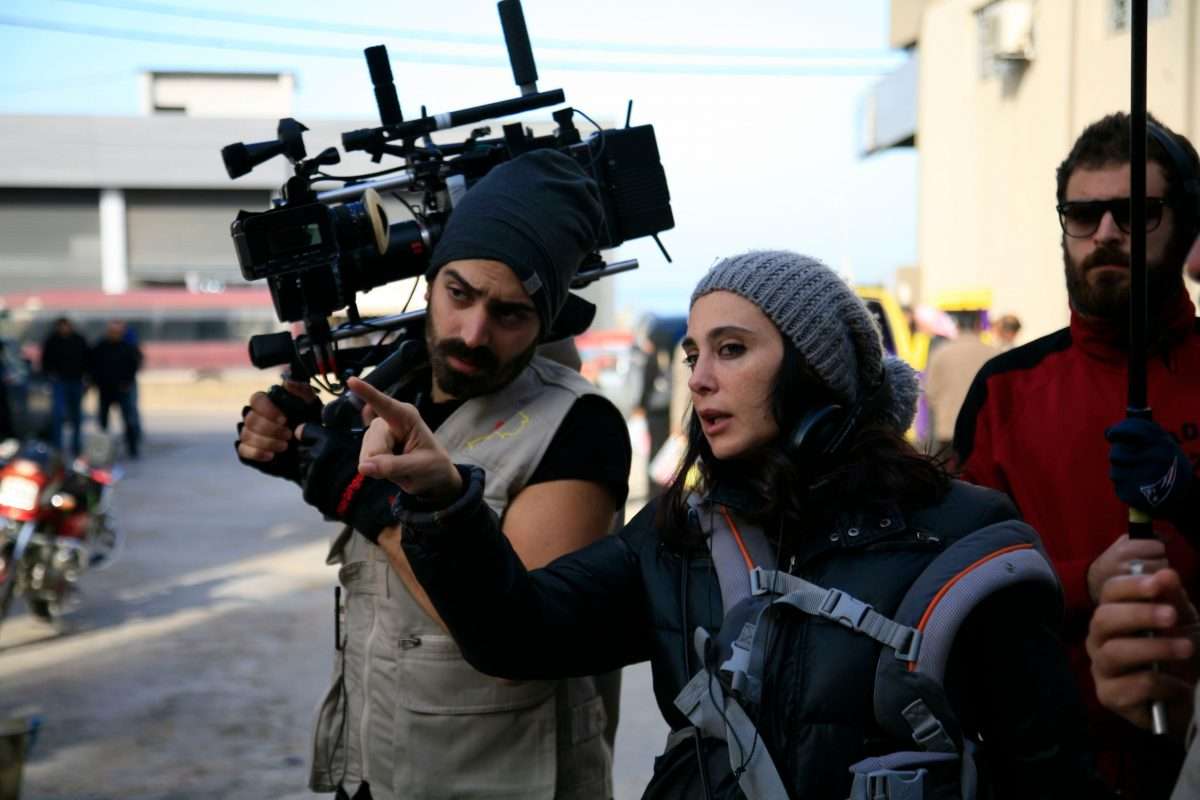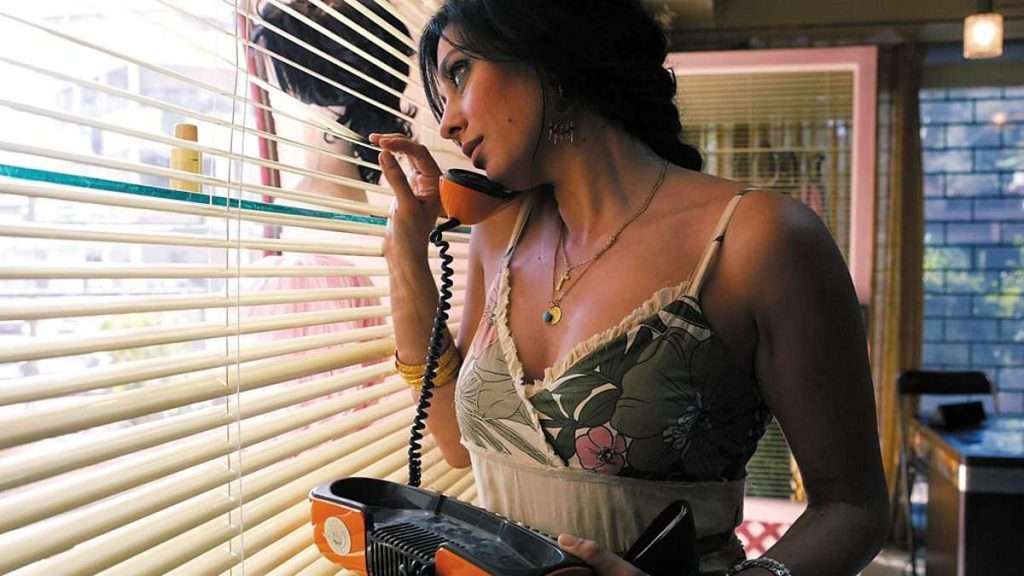
Although she has only directed three films, Nadine Labaki is considered one of the most empowering political filmmakers working today. Her audiences wait for her next project, but as she tells Chris Cotonou, it will only come when the time is right.
There was an interesting moment at November’s Marrakech Festival Jury Press Conference, when Lebanese director Nadine Labaki and Paolo Sorrentino disagreed on the purpose of cinema as a political tool. It was a riveting, if brief, debate: two very different filmmakers at loggerheads on the artform’s meaning. For Labaki, her reason was unequivocal: “Our responsibility is to use our art to help people who are suffering … especially,” she stated, “in these troubled times.”
All of us in the audience understood what she meant by troubled ‘times’. Images of war, food shortages, and protests dominate our social media. The industry also agrees with her, reflected by the films that earn the highest honour in competition: at Cannes, it was Ruben Ostlund’s satire on the elite Triangle of Sadness, and for Venice, Laura Poitras’ documentary on Nan Goldin’s fight against the Sackler family, All the Beauty and all the Bloodshed. “We as filmmakers have a voice,” she tells me, when I bring this up to her in our interview later, “this is why I believe in the power of cinema to tell human stories. To be a director is political.”
For a filmmaker so well-regarded, Labaki has only made three films so far in over ten years. The first, Caramel, was a feminist take on societal taboos in her native Beirut; 2011’s Where Do We Go Now? observed sectarian issues in a Lebanese village, but it was Capernaum where Labaki announced her talents to a wider international audience.
This Dickensian tale of a tough street-kid in the Ras Beirut slums is startling, essential viewing, and is presently the highest grossing Arabic and Middle-Eastern movie of all time. It shot Labaki’s name into the stratosphere, earning her the Jury Prize at Cannes and an Academy Award nomination, but since 2018, she has resigned herself to producing or acting in other people’s films. “I know you want to hear me say I am directing,” she smiles, when I ask about a follow up to Capernaum. “I have nothing new on the horizon that I’m making … but I have much to say, so let’s see.” True to her word, Labaki’s approach to filmmaking is similar to her on-screen performances. Her most recent credits are acting roles in [2021’s] Costa Brava, Lebanon and Perfect Strangers, two films that are founded on a social message—so it is unlikely she will do a project as passé as the screwball comedies that characterise much of Arabic popular cinema. But Labaki’s choice of work—whether she is acting, producing, or directing—confirms her as a political icon. We discussed how other journalists have been particularly interested in her opinions on current affairs, on Iran or Vladimir Putin and Ukraine—topics unrelated to her films or personal life. “How can we save the world?” I overheard one Italian journalist ask, to which a jaded Labaki replied: “I don’t know … You tell me!”
Her films are so effective in articulating ideas that she wears a burden as an artist and an activist, and every encounter with a fan appears to be about one global crisis or another. They approach her as though she is lobbying for the United Nations department of justice. Surely, this must be exhausting? “Of course, sometimes it can be heavy,” she admits to me, “but we must speak about these things. I never decided to become an activist or anything. It came with age … I just got angry. This frustration built over my lifetime and so my films are an inclination for me to turn this frustration into creativity.” Labaki admits that it would be easy for her to become cynical, but through other cinematic experiences, she has felt the change she is trying to enact in her own art. “I recently watched [the Kurdish war drama] Turtles Can Fly and it spoke so much to me that I not only felt psychologically changed but physically too,” she explains. “I was actually shaking, and that’s what great cinema should do.”
I ask whether her resonance with these stories derives from her own life. She mentions growing up in Beirut during the Civil War (from 1975 to 1990), how she never understood the sectarian borders or the ethnic divides that continue to cause so much misery in Lebanon—a microcosm for many of the issues the world is now facing—and most tragically the child refugee crisis that she explores in Capaernum. Labaki’s views, and her contrarian nature, is a product of where she grew up, she admits. “I live in the middle of a place that is divided into groups, into political factions, into religions,” she explains. “I was raised with the concept of fearing the ‘Other’—someone who doesn’t look like me, or has different rituals. But I never had that fear.” Being from the Christian minority, she recounts the first time she met a member of Lebanon’s Muslim majority and how the experience felt so absurd: “I can’t pinpoint why, but that moment was particularly important to me in understanding the way society divides us.”
Labaki is serious and direct in conversation, and is unafraid to give her opinion even if it goes against dogma. Although her politics seem to me to be left-leaning, she publicly rails against the political-correctness that she suggests is stifling art, but that is also influencing the mainstream film industry’s current output. Her point of view was actually put to director James Gray later that evening, who proclaimed—in an outburst of support for Labaki—“If a woman from Lebanon can’t say what she wants, then what’s even the fucking point?”
Nadine is resolute on the matter, and I get the impression that political-correctness is one of the areas of debate that interests her the most. “Art isn’t supposed to please everyone, because we must provoke,” she says, “and that’s why this wave of cancel culture is very dangerous. If I’m right and you’re wrong, and I get to judge you on the public tribunal, you will self-censor. I won’t hear your point of view, and that can be worse.” Labaki suggests that it’s also why so many films today feel so repetitive—that it will prevent original ideas and writing, and an emphasis on the same re-trodden subjects: “For a filmmaker it can be truly paralysing.”

One place her work was not censored—and indeed flourished—was in China. It is a quirk of Capernaum that of anywhere it was released, the biggest and most impactful reception happened under one of the world’s communist powers, earning the film over $54 million at the box office. If she believes the power of cinema is to affect global change, why does Labaki think the film was so successful somewhere so culturally opposite? “You know, I was very surprised when this happened and I’ve been trying to figure this out for a long time,” she ponders, “and I’ve heard it’s related to the children left behind in China. Many families in the countryside have to abandon their children because they are in difficult financial situations and [as in the film] the children take care of themselves. They are small and protect their siblings, just like Zain does.”
Nadine regularly refers to her “mission” as an artist. If the only impact her recent masterpiece had was that it touched the hearts and minds of thousands of suffering or empathetic audiences in a nation as repressed as China, that they saw, through a woman’s lens from halfway across the world, an idea that they could grasp hold of and keep tight and leave the cinema feeling understood, then she has already realised her mission. And so perhaps Nadine Labaki was correct that morning, when she stated so confidently that all movies worth their mettle must say something that matters.
By chance, I ran into Nadine the next day in the hotel lobby of the opulent Pearl Hotel. It was the first time seeing her standing up, and although she is five-foot-six in height, her charisma and presence makes her appear much taller. She creates an aura around her of total self-belief. None of her words are wasted, and the few times I spent around her, she managed to switch between seriousness and humour almost spontaneously: one sometimes feels caught off-guard. I think that Labaki’s conversation is much like her work: where stark themes of tragedy are met with moments of lightness and comedy.
We discuss home: the singer Fairuz and the actress Sabah—national heroes of the arts like Nadine, whose influences stretch across the entire Arab cultural world. She suggests one or two classic movies from the sixties and the seventies. “There was a phase when a woman’s sexuality was very strong in Lebanese cinema,” she adds, smiling with pride; “but it’s different now. Beirut is an uncertain place,” she remembers all of a sudden, bleakly explaining that “it is really in crisis.” As someone who has proudly remained during her career—even calling on her fellow citizens to return—I wonder if she might follow other Lebanese creatives and migrate elsewhere. Their most important filmmaker hesitates. Her eyes go sullen, and she admits that with everything happening in Lebanon “it’s even been difficult to think about making a next movie.”
It’s unfair to expect so much from Nadine Labaki right now. So much of her audience hangs on every project, but one can’t help but think back to Fairuz and the long history of Lebanese women who have been a voice for the suffering across the Arab world, and who have produced great art in times of pain. Nadine Labaki is their most important living filmmaker—their loudest and most urgent voice. But her next film will only come when it feels right for her. Because as Fairuz once sang, in the midst of the very war that Labaki was raised in: “There is no longer anything … except for waiting and boredom.”



